The curse of stardom, especially in a country like India -- which wants its Gods to be tidy and punctilious -- is that stardom forces you to stop exploring the frozen sea inside you, and instead inspires you more and more to perform out of a small puddle, observes Sreehari Nair.
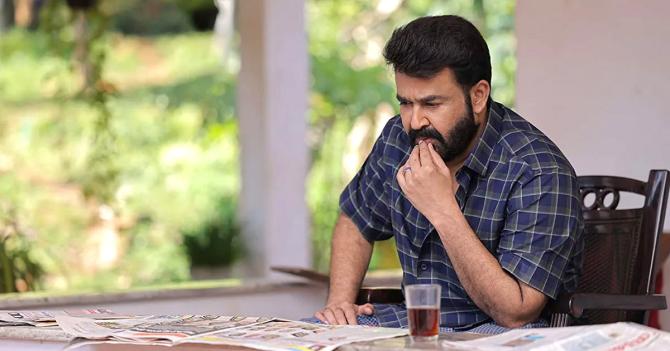
If there was ever a textbook example of an entertaining bad film, Drishyam is it.
With a plot concerning a lecherous boy-criminal who gets it in the neck, and whose missing body sets in motion sequences of police brutality, middle-class tears, and 'obligatory' directorial flourishes, all topped by a sick joke, a neat connecting-the-dots kind of ending, Drishyam's popularity showed us that even those Indians who proclaim their hatred of daily soaps *need* their regular serving of daily soaps.
Now eight years after the first installment, and with the prospect of Malayalam Cinema maturing beyond the bad yet entertaining category (to which category the Baahubali series also belongs), Director Jeetu Joseph has brought out a sequel and he clearly has doubled his ambitions.
When I say Jeetu has succeeded in fulfilling his vision, I mean that the second part of Drishyam is a worse film than the first one, and on some level, more entertaining.
The appeal is still very much that of a soap opera, though Jeetu this time has gone out of his way to give the 'depth-seeking viewer' a lot of spiritual nitrous oxide to sniff, and feel good about himself.
Themes are scattered across the narrative, as though to be caught and then broadcasted from the pulpit: Crime and Guilt, Crime and Punishment, Crime and Religion.
It's gold for the literal-minded critic who, without having to read even a chapter of Dostoevsky's book, can now reference it with gusto.
Crime and Punishment, however, for those who care beyond name-dropping, doesn't tack on its themes. It lets them on through small yet telling details -- such as that memorable bit about Raskolnikov sewing a noose into his overcoat, in which noose he intends to hold his murder weapon, an axe.
Dostoevsky's artistry lay in his understanding that without such elaborate descriptions of the mundanities which constitute an act of killing, the reader can hardly begin to gauge the final oppression that falls on Raskolnikov's soul.
No such problems for Jeetu though.
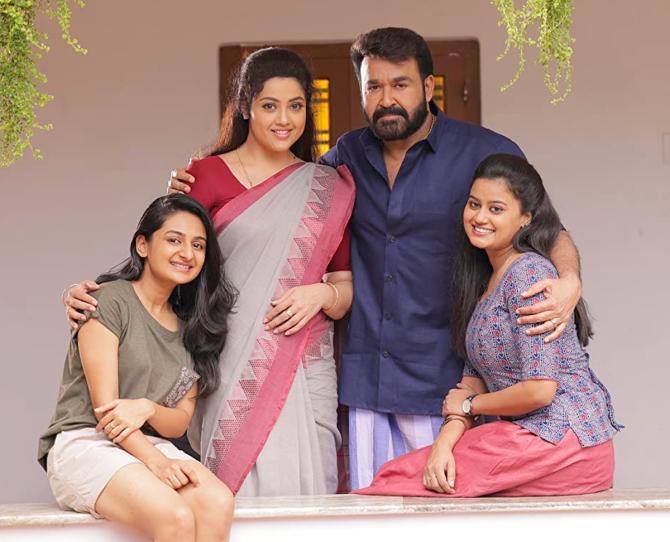
He opens D2 by treating us to some perfunctory lip-service about Georgekutty's family experiencing repentance, a couple of banal visual metaphors that suggest their feeling of being locked-in, a few shots of church-going and of bible stands -- and we are supposed to scream, 'Crime and Punishment!'
Paavam Dostoevsky; doesn't he deserve better?
There's as much emphasis here on the price of murder as there Is emotional validity in Meena (reprising her role as Rani, Georgekutty's wife) abruptly transitioning between her pensive-sounding lines and her attempts at playing celluloid-cute.
The first half of Drishyam 2 is like a solemn version of Drishyam's first half. It is a successful template, given the lacquer of graveness.
What we breathlessly wait for while plodding through the soggy hour are the big plot twists, which we are sure will soon arrive.
Why else retain our mental age for eight long years if not to see how Jeetu Joseph will divert our attention, roll out the Hitchcockian cannons, and give us that wonderful feeling that comes about when we realise we were being played all along.
The big twists, yes, they do arrive. And when they did, I couldn’t help laughing; less at the sheer inanity of their conceptions and more at the force with which they were being projected at me.
A dumb piece of writing that deserves special mention here involves a meeting between a screenwriter and a team of top cops.
The lack of logic in that scene isn't its artless aspect, oh no.
It's the way Jeetu tries to hammer into his viewers' heads Georgekutty's deviousness, how he doffs his hat to his hero's talent for always staying two moves ahead of the law -- all this by thunderously cutting away to the cops’ startled faces, as the screenwriter piles on his disbelief.
This technique, though it has its imitators in the world of television, essentially comes out of the Rajkumar Hirani School of film-making.
It's an ode to those times when Hirani would assail us with Munnabhai's goodness, by cutting between Sanjay Dutt making a humanitarian speech and the tear-filled faces of those moved by it.
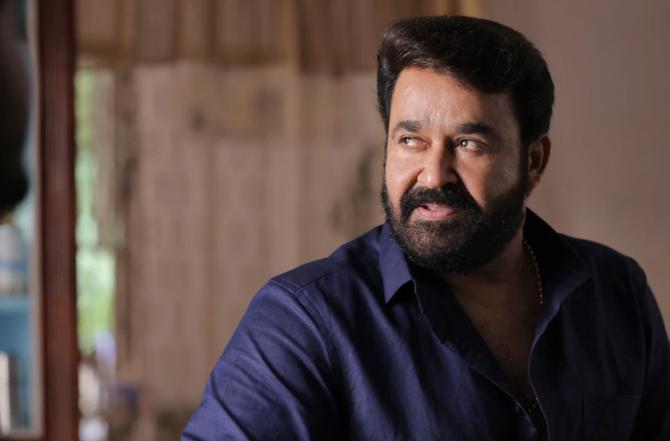
The big twists in D2, including a set-piece in a forensic lab, are all howlers, and the eye of time would judge them as just that.
Now that we have come this far, I may as well tell you my contention isn't so much with Drishyam's plot-based inanities as it is with the critical detritus they seem to have triggered.
That these gaffes would be enough for some very intelligent critics to say 'Drishyam is a Writer's Film and not a Director's Film' is the trend that I wish to contest.
To begin with, such theoretical peccadilloes come out of a romantic notion.
It's more of a willed form of misunderstanding about the divisions of labour involved in film-making.
According to this notion, screenplay writing is what a writer does on the page, locked in a room, alone for months.
The fruit of this toil, if the writer is lucky, is a finished script consisting of a film's plot, characters, and dialogues.
Exit Writer, Enter Director.
He takes the sheets of paper handed to him by the screenwriter and adds to them 'directorial touches'.
When the notion is severely misplaced, these 'directorial touches' amount to camera movements that call attention to themselves.
If one were to take in this notion blithely, one would conclude that directors who are known to make 'Director's Films' have an inherent gift for salvaging bad scripts using their extraordinary 'visual sense' -- which is the exclusive domain of the director, just as 'verbal sense' is the exclusive domain of the writer.
As I see it, the process of taking a bad script and rescuing it through 'Direction' is the equivalent of someone taking a sentence which says nothing new, offers no fresh insight, and replacing the words in it with their complex-sounding synonyms.
Assuming that we have some clarity about the misconceptions surrounding the process, let us see how film-making happens in the real world.
A movie usually begins with a writer and a director getting their enthusiasms entwined over the germ of a story.
If it's an honourable director we are talking about, one not given merely to commercial considerations, his approval of a story idea would be based on the many possibilities that the idea opens up: Visual possibilities, an excuse to examine a hundred interesting questions, the ambition naturally demanded by the idea etc.
The Viscera of a film is formed in the director's head at this stage.
If it's not formed by then, expect stumbling at every subsequent step.
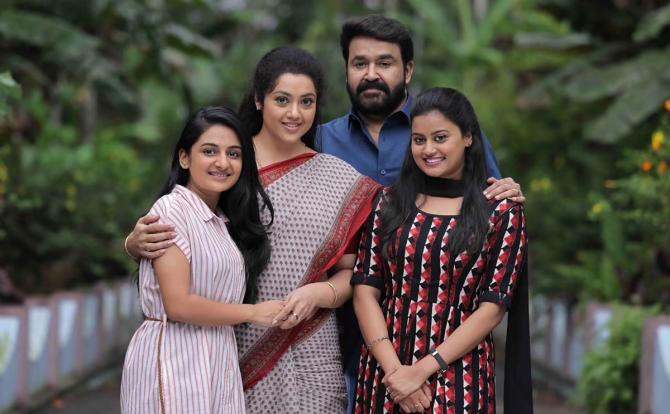
The writer and the director, then, work at hashing out the script together (This phase cannot be bypassed even in the case of films that begin with a writer approaching a director with a finished script, or those instances when a director is also the writer).
It's precisely because screenwriting and directing are such interpenetrative crafts that the terms 'Writer's Film' and 'Director's Film' seem to me so problematic.
Any film-maker worth his salt will tell you that good direction will invariably have a measure of good writing.
And ask any good screenwriter and he'll tell you that a well-written film would invariably have taken into consideration things like camera angles, staging and composition, costume, and use of music, at the scripting stage itself.
Even so, the bare fact of the matter is that in a good film, in a film that feels alive, a lot of the writing choices have to happen on the set.
The essence of a good director -- tuned always to the Viscera of his movie -- is his talent for taking a script and tweaking it every single day by factoring in all the mishegas* that occur during shooting, and later during editing and dubbing.
And a good screenwriter will adapt to the many practical aspects of getting a film made -- such as the environment in which two characters engage in a conversation with each other, or the physical distance between them.
The intonations in the dialogue that gets finally written will be born out of such practical considerations.
There is no other way to play the game.
If there's any truth to phrases like 'Transcending the Script', it has to do with what I have stated above.
I am not even getting into the subject of working with actors, which according to me, is the most crucial aspect of film-making.
If you have constructed separate housings for writers and directors, where does 'working with actors' fit in exactly?
It's something that starts off during the writing (after the script is locked, after specific actors are cast in specific roles, and some rewriting becomes mandatory), but achieves its absolute form on the day of shooting.
But why should actors figure in the scheme of critics who carry in their pockets such ideas as Pure Cinema?
It is also an observation of mine that Pure Cinema enthusiasts are the ones whose voice rings loudest in movie theatres, as they go about inquiring into plot-points.
These unfortunate souls get so lost in puzzling out the machinations of film-making that they have to repeatedly poke at the shoulders of those sitting beside them and go: 'Why did they Kill Him?' or 'Wasn't he Gay? When did he Change?' or 'I thought she loved him. Didn't She?'
On the other hand, those of us who understand that cinema is a coming together of many art-forms (architecture included) have our minds adjusted to letting the plot play out like a background score, and our response to the screen is rather sensuous.
We know that films aren't that difficult to understand, they shouldn't be, and if they are, as is the case with many of Nolan's windy productions, it's because those films aren't well-made.
If theoretical classifications were to continue at its current pace, a motion picture that is shot on a grand set will very soon be called a 'Production Designer's Film'.
And a picture with a lot of intercutting will be referred to as an 'Editor's Film'.
Beyond such critical taxonomies, however, is the existence of a film that satisfies our basic desire for pulp: The 'it's-all-plot' film.
The 'it's-all-plot' film exists to pleasure you with one plot-point after another, and its effects would be lost if you give out the spoilers (On the contrary, I can give you most of the spoilers in Andhadhun with the confidence that it would not impinge on your viewing experience).
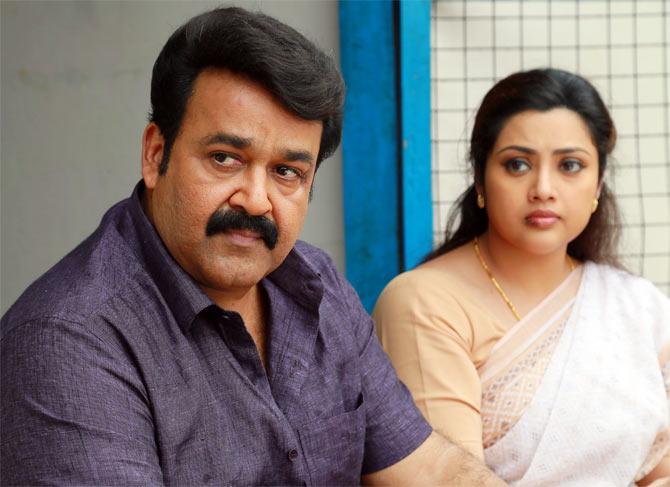
Drishyam, then, is a 'it's-all-plot' film, a film in which props have been chosen, and issues like causality and sobriety of moral judgment addressed, with one eye on how useful they would be to achieving the next big high in plot terms.
What are the possibilities for double-crossing the viewer?
This is Jeetu Joseph's primary consideration in every scene.
And for those viewers who don't mind being needled this way, there is ample entertainment at stake in the film.
It's just that classifying such a work as a 'Writer's Film' is an insult to the craft of screenwriting which, at its most premium, is a lot more than just plotting and writing superb exchanges of dialogue.
If at all there is an aspect of Drishyam's writing that deserves discussion, it has to do with the character of Georgekutty.
Mohanlal, in a recent interview, had said he did not understand the character, and that was that.
But Georgekutty is not the Ungraspable Phantom the movie wants you to think he is.
As a matter of fact, the man is built on a somewhat typical behaviour that we all unwittingly exhibit.
We often read in the papers about a criminal who was caught and sentenced because he hadn't covered his tracks.
We go over such news with relish and then surmise over a casual conversation: 'If only, he had been vigilant enough to do this or that...'
In short, we write the perfect crime for him.
At one level, we want justice to be served, while a part of our screwy brain, the part that helps us undertake minor acts of criminality necessary to get through our lives, wants criminals to be smarter than the law, to beat the law at its own game.
Thinking up a character who indulges this grey tendency in us is a form of artistic mugging, and let us be very clear about that.
Jeetu Joseph has some interest in the psychopathology of the criminal, but the real subject of his study is the psychopathology of the average nobody, of the moviegoer.
There was a period in Mohanlal's career when he would have been perfect to play Georgekutty.
That would have been 25 years ago, when he was drawing generously from his unconscious.
Writing when it is good and acting when it is good, are both bound by Kafka's theory of literature being 'a hatchet with which to chop at the frozen seas inside us.'
The curse of stardom, especially in a country like India -- which wants its Gods to be tidy and punctilious -- is that stardom forces you to stop exploring the frozen sea inside you, and instead inspires you more and more to perform out of a small puddle.
When the first part of Drishyam had come out in 2013, there were murmurs going on about Mohanlal not taking care of his body.
'Too hedonistic and too careless,' went the silent charge.
These criticisms weren't entirely unfounded, but the actor, whose intuitions are sharper than his interviews make them seem, had back then, very smartly, given to Georgekutty some of his own Falstaffian self-doubt.
This time around, Mohanlal looks leaner and fitter.
He arrives with no paunch or love handles or excess facial fat -- and weirdly enough, the self-doubt that we saw in the character of eight years ago is missing this time.
Small things, trivial things really, such as Georgekutty fake-eating the idliss that his wife makes for him (the abstinence is understandable because the actor is presumably on a Keto diet), don't allow for the scope of the character to be enlarged.
This time around, Jeetu's paeans and his servile camera do most of the actor's work for him, and so, he is not even required to be as agile as in Drishyam (remember Georgekutty's up-from-a-reverie kind of reaction to a car honking incessantly behind him? Nothing of that sort happens this time).
This time around, Georgekutty is a star, which means a lot of walking in slow motion, and turning his devious yet impenetrable face to his camera.
For Drishyam 3, he can maybe come on as a voiceover, and even that would be just fine.
The goal of writing a character with no self-doubt is to a great extent achieved in Thomas Bastin, the chief investigating officer, played by Murali Gopy.
Thomas Bastin is an expert rhetorician: someone who it seems has never had a quarrel with himself.
Etymologically speaking, the character is a close relative of the type we see on TV debates, the kind of person whose utter confidence can be a distasteful spectacle, but Jeetu Joseph's and Murali Gopy's big success here is ensuring that Bastin is no bore.
In fact, Gopy's is far and away the best performance in Drishyam 2. Jeetu has proceeded on the mathematical assumption that if Georgekutty's genius has to be quadrupled, then the cop tailing him has to be made at least twice as smart as the cop in Drishyam.
There you have again -- the psychopathology of the moviegoer.
That being said, it's Bastin and his team of policemen who give the sequel its forward momentum.
The bureaucratic hiccups they face, and their paranoid snooping reminiscent of the Cold War Era, are the major sources of entertainment here.
And yet, even in these portions, when Jeetu has to blow up the plot and focus on the little details, he lands his film in Palookaville.
Watch out for a scene where Thomas Bastin recreates for his juniors a key event from Drishyam.
He begins to lay out on a whiteboard, tiny circles and connecting lines.
All he's doing there is explaining a simple journey from Point A to Point B and back, though the rather intricate diagram he contrives suggests the charting of the debacle of Dunkirk.
But this world of serious map-drawing police officers and screenwriters used as crime mules does make for entertaining soap opera.
In India, Soap Opera has become such a terminally infected category that it is nearly impossible for anyone with any taste to even *think* that something soapy and trashy could be enjoyed on its own terms.
I am, however, growing more and more convinced that when compared to art that tries to touch the wholesome corners of your heart, when compared to art that 'congratulates you for being you' and that 'respects you for being warm and tender,' when compared to movies like Dil Dhadakne Do, Soni, and The Great Indian Kitchen or books like To Kill a Mockingbird, a piece of enjoyable trash will very rarely set up a terrible mutual admiration society, will very rarely honour its consumers for honoring it.
Audiences would be correct in finding the silly pleasures of the Drishyam franchise irresistible.
But when it comes to reading some of the analyses relating to the Drishyam franchise, audiences are advised to resist all attempts at extolling its non-existent virtues.
It doesn't matter if these extolments are achieved through bizarre theories, or through the digging up of famous Russian corpses now long buried.
*A Yiddish word that can be interpreted as hectic, crazy, or eccentric, according to Wikipedia.
Feature Presentation: Rajesh Alva/Rediff.com










